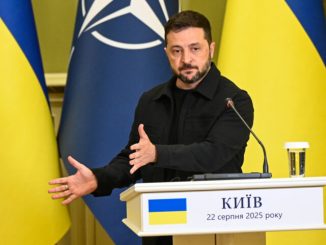
North Korean people work on a military fence near their guard post at the inter-Korean border in this picture taken from the observation deck near the demilitarized zone that separates the two Koreas in Paju, South Korea, June 4, 2024. REUTERS/Kim Hong-Ji/File Photo Purchase Licensing Rights
| Published July 9, 2025
At Sea, A Quiet Passage—And a Political Signal
Amid simmering tensions and long-frozen diplomacy on the Korean Peninsula, six North Koreans who had drifted into South Korean waters found themselves at the center of an unexpected moment of humanitarian cooperation. This week, South Korea quietly returned the group to their homeland—a rare event that may speak louder than any political statement. With no fanfare and no formal response from Pyongyang, the transfer marks not just a literal crossing of boundaries, but potentially the first ripple of change under the new South Korean administration’s softer tone toward the North.
✅ What happened
-
Repatriation completed: South Korea’s Unification Ministry confirmed that six North Korean individuals—who drifted into South Korean waters earlier in the year—have been sent back to North Korea
-
Humanitarian motivation: All six reportedly expressed a repeated wish to return home, prompting Seoul to act on compassionate grounds.
-
Diplomatic reengagement: Though Pyongyang remained officially silent during repatriation arrangements, a North Korean patrol boat awaited at the transfer site. The six were returned aboard one of their original wooden vessels.
🧭 The broader context
-
Shift in leadership and policy direction: Newly inaugurated President Lee Jae Myung (in office since June 4) is steering South Korea toward re-engagement with the North, emphasizing diplomacy over confrontation
-
He has halted loudspeaker broadcasts and discouraged anti‑North Korean leafleting, aiming to ease cross-border tensions
-
-
Challenges in communication: Formal dialogue channels with Pyongyang remain largely suspended—a fallout from stalled nuclear talks since 2019. Seoul relied on the U.N.–led military command to notify North Korea and managed the repatriation despite the silence
-
Symbolic resonance: Though rare, such maritime repatriations underscore the humanitarian element in cross-border policies. In past cases, Seoul has taken similar actions when individuals insisted on returning.
 Resulting Effects:
Resulting Effects:
🔹 1. Humanitarian Impact
-
Respect for personal choice: South Korea upheld international norms by repatriating individuals who clearly requested to return—avoiding forced defection or prolonged detention.
-
Image of compassion: This action boosts Seoul’s humanitarian image both regionally and globally, especially under new leadership.
-
Public reaction split: While some South Koreans supported the humane handling, critics—especially among defectors and conservative groups—warn that returnees might face punishment in the North.
🔹 2. Political Messaging
-
Shift in diplomatic tone: This move signals a clear break from the more hardline stance of the previous administration. President Lee Jae-myung is seeking to dial down military tension and restart engagement.
-
Unilateral goodwill: Even in the absence of any North Korean acknowledgment, the act serves as a symbolic olive branch—inviting a possible soft restart to stalled inter-Korean diplomacy.
-
Testing the waters: Pyongyang’s non-response shows that while tension may de-escalate slightly, official dialogue remains frozen.
🔹 3. Military & Security Implications
-
Temporary calm across the DMZ: Lee’s administration has also suspended provocative loudspeaker broadcasts and is discouraging anti-North leafleting, reducing the chance of retaliatory escalations like balloon launches or artillery drills.
-
Continued vigilance: South Korea’s military and the UN Command remain alert. Despite this symbolic cooperation, North Korea continues to develop weapons, keeping security risks high.
🔹 4. Domestic and Policy Repercussions
-
More room for engagement policies: This repatriation may help the administration build momentum for reopening humanitarian aid, family reunions, or even hotline communication.
-
Backlash from hawkish factions: Critics inside the National Assembly and civil society could interpret this as appeasement or as compromising national security.
🔹 5. Regional Diplomacy Effects
-
Signals to allies and rivals: This case demonstrates South Korea’s independent initiative, subtly reminding China and the U.S. that Seoul is willing to act on humanitarian instincts even without direct consultation.
-
Pressure on North Korea’s image: Pyongyang may be scrutinized internationally for how it treats the returnees—especially if harm comes to them.
 Bottom Line:
Bottom Line:
While the quiet return of six North Koreans might seem like a small maritime footnote, its implications ripple far beyond the sea border. It reflects a South Korean administration eager to replace confrontation with cautious diplomacy, even in the absence of dialogue. By choosing humanitarian principle over political gain, President Lee Jae-myung’s government has sent a subtle but powerful message: reconciliation, however distant, begins with recognizing shared humanity. Whether North Korea responds—or remains silent—this repatriation marks a shift in tone that could shape the fragile future of inter-Korean relations.





Be the first to comment